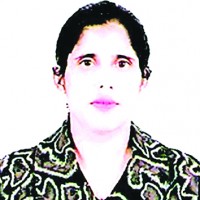Linking Academic Research With Development
Dr. Ira Sharma
Tribhuvan University (estd. 1959) is the first and biggest university in Nepal. It is a non-profit making autonomous institution run by the Government of Nepal. Enrolment-wise, TU is the 10th largest university in the world. It has 60 constituent campuses and 1,084 colleges all over the country. It offers 1,079 courses at Bachelor's level and 1,000 courses at Master's level and Ph.D. degrees in almost all streams. It has around 8,000 teaching faculties. There are 39 central departments and 4 research centers under this university. At every level and faculty, the research work is mandatory for each student to get through. Hence, it has a strong infrastructure for research activities. But there is a need to manage it well.
In 2018/19, more than 70,000 students graduated from TU in different academic disciplines. These people, on one hand, are required to lead the nation while on the other, there is a challenge to develop huge job market to absorb them. Moreover, this resource is almost wasted every year due to lack of vision and mission to connect them with the market.
The preamble of TU Act 1992 seeks to prepare capable human resources required for the overall development of Nepal, impart standard higher education, do research works on various fields, protect and develop national culture and tradition. The irony is that most of the products remain unemployed or fly abroad for further career, because the available opportunities are not adequate here.
In contrast, there are several sectors where skilled manpower is lacking and as a consequence, foreign experts are hired. Hence, the need is to invest in something that can fix these gaps and education will prove to be life supportive tool for individuals as well as the nation. An employment market research is prominently required, which can give clues about the type of manpower needed for the nation at present and in a long run basis. Additionally, the government should generate both long and short term national plans that can pinpoint the needful quantity and quality of human resources for the future. This requires far sighted employment policy of the government including the management of university graduates and their research works. This should be worked out both from federal as well as the Pradesh government level.
TU works for providing standard higher education to the people. Practically, the standard of education system is measured by ability of the graduates. The question is whether they can live by their academic degree or not. For example, those with Master's in Arts or Science are doing agro-farming, doctors/ engineers joining the administration of civil service or many degree holders are going abroad as labors. These all indicate the wastage of private or government investment for higher education. Rather, TU can make agreement with all private organisations, corporate houses and national level development projects to employ a part of its graduates as apprentice staff.
Firstly, research oriented education should be focused in TU curriculum. A good research brings new ideas, knowledge and solution to a problem. This enhances practical skills, confidence and adds self-dependency to the work they are involved in. However, a research should never be a copy paste deal nor can it be a fully mentor guided manual. This should help the students/ researchers storm their mind to bring out original knowledge and ideas.
Secondly, it is essential to tie up the student's research works with organisational needs for their speedy progress. Those organisations can utilise research findings as a tool to make improvements in economy, business, agriculture, environment, society, health, food/ water/ hygiene and more. The research works can be well integrated to the private and public industries, where the innovative ideas are widely expected.
Finally, those academic research works can be utilised to generate new ideas about national issues such as the environmental problems, traffic management techniques, agricultural innovations (hybrids and GMOs), public health issues, better education system, waste management techniques, information technology, tourism business, social malpractices etc. A country can feel the quality of those graduates as a human resource, if the university focuses on applied research in every department in coordination with the government.
There are four councils of TU, constituted as major decision making bodies of the university- Executive, Academic, Planning and Research Coordination Council. The Research Council formulates policies on research activities, approves guidelines for researchers and coordinates the functions of university level research organisations. Centre for Research is the secretariat of the council. But, practically, their presence is nowhere felt. Actually, these councils could be a bridge between the knowledge and the development aspects of the country.
(Dr. Sharma is a biologist and researcher. Irasg123@gmail.com)
Recent News

Do not make expressions casting dout on election: EC
14 Apr, 2022
CM Bhatta says may New Year 2079 BS inspire positive thinking
14 Apr, 2022
Three new cases, 44 recoveries in 24 hours
14 Apr, 2022
689 climbers of 84 teams so far acquire permits for climbing various peaks this spring season
14 Apr, 2022
How the rising cost of living crisis is impacting Nepal
14 Apr, 2022
US military confirms an interstellar meteor collided with Earth
14 Apr, 2022
Valneva Covid vaccine approved for use in UK
14 Apr, 2022
Chair Prachanda highlights need of unity among Maoist, Communist forces
14 Apr, 2022
Ranbir Kapoor and Alia Bhatt: Bollywood toasts star couple on wedding
14 Apr, 2022
President Bhandari confers decorations (Photo Feature)
14 Apr, 2022











